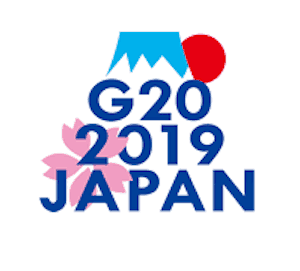 Finance Ministers from the world’s 20 most powerful economies have “…reaffirm(ed) (their) commitment to applying the recently amended FATF Standards to virtual assets and related providers for AML (anti-money laundering) and CFT (anti-terrorist finance),” in a communique issued from a meeting they held this weekend in Fukuoka, Japan.
Finance Ministers from the world’s 20 most powerful economies have “…reaffirm(ed) (their) commitment to applying the recently amended FATF Standards to virtual assets and related providers for AML (anti-money laundering) and CFT (anti-terrorist finance),” in a communique issued from a meeting they held this weekend in Fukuoka, Japan.
Ministers from various government departments took part in focused ministerial meetings June 8th and 9th, just ahead of the general G20 Summit they will take part in Osaka on June 28th and 29th.
The FATF is an intergovernmental organization created in 1989 to combat, “…money-laundering and terrorist financing and other related threats to the integrity of the international financial system.”
No details regarding the amendments to the FATF’s “Public Statement – Mitigating Risks from Virtual Assets,” appear to be circulating publicly at this time.
The same document that was published by the FATF in February of this is year still appears to be featured on the FATF website.
In short, that documents calls for:
- countries applying a risk-based approach to the trading of crypto-assets and apply “rules commensurate” with the risks
- VASPs (Virtual Asset Service Providers) being registered and licensed in the jurisdictions where they originated
- VASPs being subject to “adequate regulation” and monitored to ensure they are conducting proper KYC/AML (customer identification/anti-money laundering) procedures
- regulatory staff being empowered to impose discipline on non-compliant VASPs, including the withdrawal of licenses
- countries acting, “…rapidly, constructively, and effectively provide the widest possible range of international cooperation in relation to money laundering, predicate offences, and terrorist financing relating to virtual assets.”
- countries, “…ensur(ing) that beneficiary VASPs obtain and hold required originator information and required and accurate beneficiary information on virtual asset transfers, and make it available on request to appropriate authorities.”
In response to the FATF directives, representatives from the Crypto Valley Association (headquartered in Zug, Switzerland) asked that the proposed FATF rules governing VASPs be nuanced, and that, “The definition of Virtual Assets should not be broadened…The term VASPs and custodial services…be clearly defined…(and that the FATF)…allow alternative means of identity validation…” among other things.
To advocate for the industry, VASPSs are holding their own concurrent “V20” meeting in Osaka at the end of June in order,“…to deliver a coordinated response to the updated standards proposed by the Financial Action Task Force (FATF).”
According to V20 organizers, “V20 Proposals” to the FATF include:

